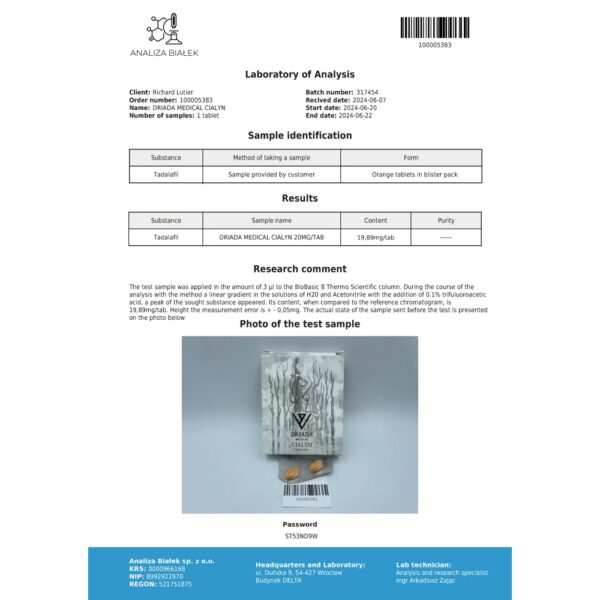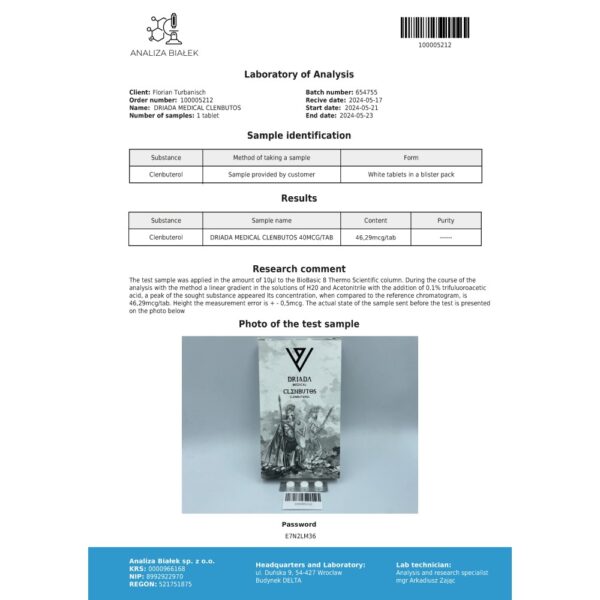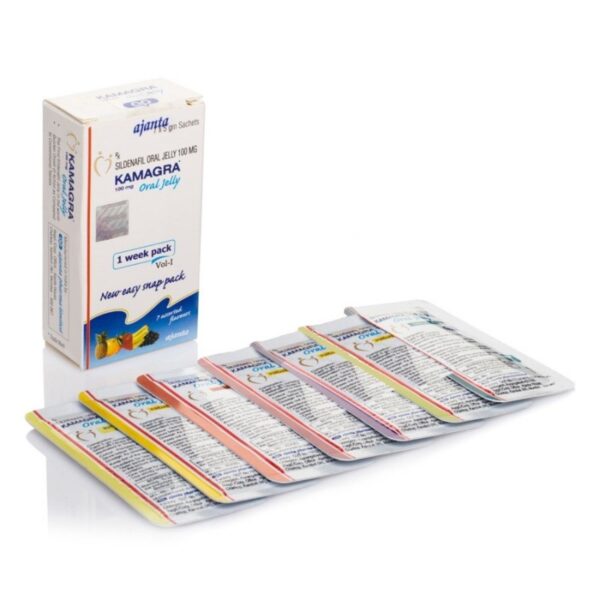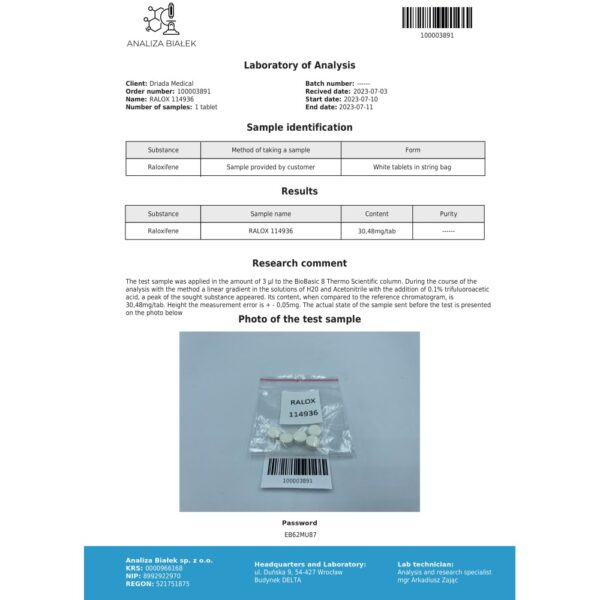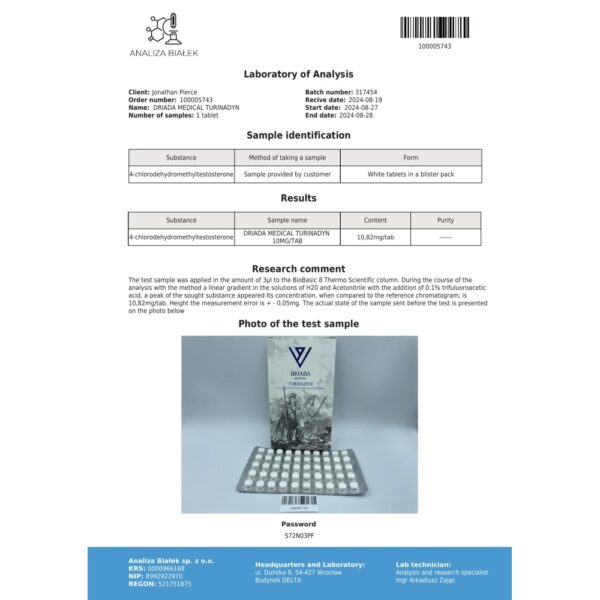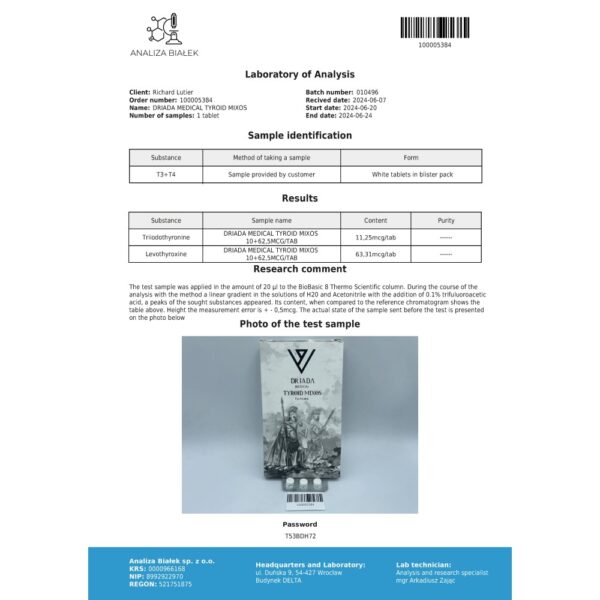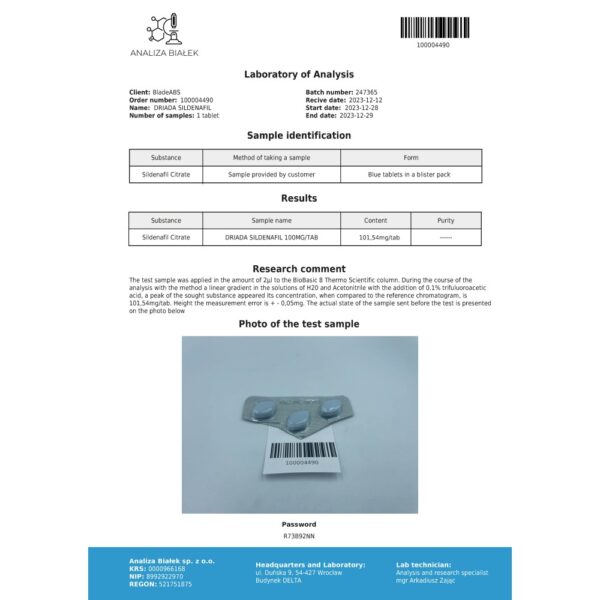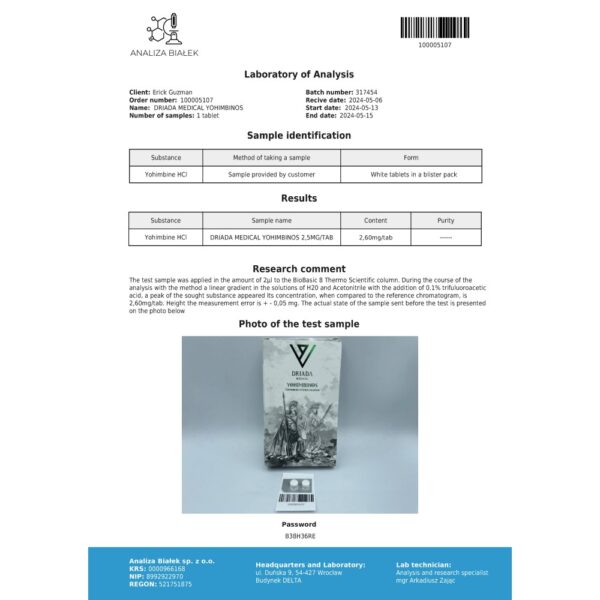What is Liothymed 25 mg (T3 — Triiodothyronine)?
Triiodothyronine (T3) is an active hormone synthesized in the thyroid. Thyroid is crucial for various physiological processes. Iodine inclusion is the main peculiarity of thyroid hormones. This feature plays a significant value in body development and metabolism. Specifically, T3 is engaged in the regulation of metabolism and energy allocation. Due to this feature, it influences almost all tissues in the body. The hormone is essential for the normal development of the central nervous system during growth. It also contributes to the maintenance of metabolic homeostasis in adults.
The thyroid gland stores large quantities of hormones. They can be produced in different body organs, including the liver, the brain, etc. The adenohypophysis regulates the amount of thyroid hormones in plasma. It uses Thyroid-Stimulating Hormone (TSH) and acts through negative feedback mechanisms. T4 (thyroxine) is the primary hormone produced by the thyroid gland. It is used to produce T3 by converting it into peripheral tissues.
Effects
- Regulates metabolism.
- Enhances fat burning.
- Promotes muscle growth when combined with anabolic steroids.
Mechanism of Action
The action of Liothyronine (T3) in the body imitates the activity of natural thyroid hormones, primarily Triiodothyronine. It regulates diverse metabolic processes. The ingredient affects the body on the molecular level, acting through biochemical reactions. Most frequently, the substance binds to thyroid hormone receptors (THRs) located in the nuclei of cells. Below, we explain through which mechanisms the component affects metabolism:
- Increase in basal metabolic rate (BMR). T3 stimulates the production of ATP and increases the rate of oxygen consumption by cells. These effects result in enhanced energy expenditure.
- Promotion of lipolysis. T3 influences triglycerides, stimulating their breakdown into free fatty acids and glycerol. This impact makes fat stores more accessible for energy production.
- Thermogenesis. T3 affects the process of heat production in the body. The substance influences brown adipose tissue, which contributes to higher energy expenditure.
- Enhanced oxidative phosphorylation. The presence of T3 in the body leads to an increase in the number of mitochondria in cells. This fact boosts the rate of an oxidative process of transferring a phosphoric acid residue from a phosphorylating donor agent to a substrate.
Thyroid Hormone Receptor Binding
When entering the body, T3 strives to penetrate cell nuclei and bind to thyroid hormone receptors (THRs). In the body, these receptors perform the function of transcription factors, regulating specific gene expression. When the binding between T3 and the receptor-hormone complex occurs, the latter can further bind to thyroid hormone response elements (TREs) on DNA. This process inevitably influences the transcription of target genes.
Increase in Basal Metabolic Rate (BMR)
T3 enhances overall energy expenditure by stimulating several metabolic processes:
- ATP production. T3 increases the synthesis of ATP, affecting gene expression. This effect is achieved due to the ability of the ingredient to influence an oxidative process of transferring a phosphoric acid residue from a phosphorylating donor agent to a substrate. By enhancing enzymes in the electron transport chain, the component increases the rate of oxygen consumption by cells.
- Oxygen utilization. The ingredient boosts mitochondrial activity. It means that more oxygen is used by tissues for functioning. This feature increases the metabolic rate and energy expenditure.
Promotion of Lipolysis
The regarded component affects triglycerides. Under the action of T3, they break down into free fatty acids and glycerol. Due to this feature, the body can use fat stores to produce more energy.
- Hormone-sensitive lipase activation. T3 activates hormone-sensitive lipase (HSL). It’s an enzyme used in the chemical reaction of decomposing stored triglycerides in adipocytes under the influence of liquid. This process contributes to the release of free fatty acids into the bloodstream and its further oxidation to produce energy.
- Enhanced fat oxidation. T3 is used to improve the expression of genes involved in beta-oxidation of fatty acids within the mitochondria. This biological process contributes to the use of fat cells as a primary energy source.
Thermogenesis
The component is essential in regulating the process of heat production in the body. By affecting brown adipose tissue (BAT), it causes the following effects:
- Uncoupling protein expression. Thermoginin is an uncoupling protein UCP1, which is located in the body between the shoulder blades. It is responsible for the mechanism of producing heat and performing a warming function. Other types of protein are present in other tissues, but when performing the transport function of electron delivery, they separate them from the ATP component.
- Enhanced heat production. T3 is effective in the activation of thermogenic pathways. Since it affects the body’s ability to produce heat, the component contributes to enhanced calorie burning and a higher basal metabolic rate.
Enhanced Oxidative Phosphorylation
T3 boosts the rate of an oxidative transfer of a phosphoric acid residue to a substrate. This is the main process, through which cells generate ATP:
- Mitochondrial biogenesis. T3 stimulates the production of new mitochondria in cells, which leads to making cells more powerful and effective. The process helps achieve higher ATP production.
- Gene expression modulation. T3 affects key mitochondrial genes and proteins involved in the electron transport chain, causing their upregulation. This tendency results in enhanced efficiency of ATP production due to the oxidation of carbohydrates and fats.
Clinical Applications
Fat Loss
In the context of fat loss, T3 acts passively. It does not affect significant weight loss, so it’s usually combined with other supplements. Bodybuilders tend to use T3 in their cycles to achieve quicker metabolic rate and enhanced lipolysis. T3 is beneficial for fat burning since it affects metabolism. However, no direct effect on fat is caused.
Hypothyroidism
The substance is used to treat clinical syndrome that develops due to long-term, persistent thyroid hormone deficiency in the body or when resistance to the hormone develops at the tissue level. When levothyroxine (T4) alone is insufficient, T3 is added.
Concentration and Focus
It was clinically approved that T3 is effective in improving focus and concentration.
By optimizing the level of thyroid hormone, the medication may enhance overall brain function, leading to better attention and mental clarity.
Psychological Disorders
When scientists conducted ingredient studies, they tested T3 for its ability to treat certain psychological disorders, including depression and bipolar disorder. The thing is that thyroid hormones play a significant role in brain development and mood regulation. Thus, scientists expected that the component can affect these brain zones. The research showed a positive tendency in the treatment of patients who did not fully respond to antidepressants alone.
Dosing Strategies for Fat Loss
To determine the optimal dosage of T3 for fat loss, it’s necessary to implement it partially. It’s recommended to start taking the medication from 25 mcg per day. Further, consumers should increase the dosage gradually by 25 mcg every 5–6 days until a maximum of 100 mcg per day is reached. Consumers often use a pyramidal dosing method, i.e. they increase and decrease the dosage (e.g., 25 — 50 — 75 — 100 — 75 — 50 — 25). A cycle usually lasts 5–6 weeks, followed by a break of at least 6 weeks to allow thyroid function to normalize.
Monitoring Protocols
In order to ensure safe and effective use of the medication, consumers should monitor their condition regularly and pass tests. Key parameters to track include:
- TSH levels. An optimal result should range between 0.5–2.0 mU/L.
- Free T3 (FT3) and free T4 (FT4) levels. FT3 levels should generally be within the range of 2.0–4.4 pg/mL, while FT4 should be between 0.8–1.8 ng/dL.
- Lipid profile. Regular checks for cholesterol and triglycerides allow for detecting any lipid metabolism disturbances promptly. Elevated lipid levels can indicate an imbalance in thyroid hormone therapy.
- Complete blood count (CBC). This test helps monitor hematological side effects.
- Heart rate and blood pressure. This examination allows for monitoring an increase in heart rate and blood pressure.
Side Effects
- Chest pain, discomfort, or tightness.
- Difficulty with swallowing.
- Extreme fatigue.
- Fainting.
- Fast, slow, irregular, pounding, or racing heartbeat or pulse.
- Heat intolerance.
- Nausea.
- Sweating.
- Tremors.
Warnings
Although the benefit of T3 for metabolism is approved, it can still carry potential risks for consumers’ health. Overuse or incorrect dosing can lead to several adverse effects, such as:
- Cardiovascular issues. T3 possesses stimulatory effects on the heart, because of which high doses of T3 can cause tachycardia, arrhythmias, and other related cardiac issues.
- Muscle loss. If anabolic support is not added to the therapy, significant muscle loss can occur. Excessive consumption of T3 can lead to muscle catabolism and reduced lean body mass.
- An increased level of blood sugar. The ability to increase the blood sugar level is one of the side effects of T3. This feature can affect glucose tolerance and potentially worsen diabetes. Diabetic patients who consume the medication need to monitor their blood sugar.
- Bone density reduction. Prolonged use of high doses of T3 can make bones thinner and more prone to fractures.
- Pregnancy and breastfeeding. T3 Liothyronine Sodium 25 mgis generally considered safe to use during pregnancy. It passes into breast milk in small amounts but continuing thyroid hormone therapy is essential during breastfeeding. Thus, women should inform their healthcare provider if they are pregnant or planning to breastfeed while using T3.
- Seniors. Older adults may be more sensitive to the effects of Liothyronine. In particular, concerning cardiac side effects.
Storage
- Keep away from children.
- Keep in a cool, dry place, away from direct sunlight.
- Store at room temperature.
- Do not use it after the expiry date.
Contraindications:
- Untreated subclinical or overt thyrotoxicosis.
- Acute myocardial infarction.
Why to Choose Us?
Driada Medical Store is a famous name in the medical sphere. We’re a trusted supplier of pharmaceuticals and dietary supplements. Clients can Triiodothyronine buyon our website. However, our catalog comprises dozens of generic products for different purposes. We have a high reputation in the sphere of pharmaceutical production. Our expertise is approved by taking the leading place in the ranking of top manufacturers.
Yet, note that we’re not just an online pharmacy where you can buy the needed medications without prescriptions. On our website, customers will find not only T3 pills for sale.We create a community of like-minded people. Our main goal is to become a place where clients can get any type of assistance and find answers to their questions. We strive to create a community where people are united by the idea of making health better and prolonging well-being.
FAQ
How long do you have to wait to eat after taking Liothyronine?
Note that the medication is taken once per day on an empty stomach. Thus, it’s better to do it before breakfast. You can eat 30–60 minutes after taking the drug.
What foods should you avoid when taking Liothyronine?
Generally, the medication is compatible with all food products. However, it’s recommended to avoid fatty food and alcohol.
Can I drink coffee with Liothyronine?
Generally, the medication is taken on an empty stomach. Thus, you should not mix the drug with caffeine. However, it’s not forbidden to drink it during the day.
Is weight gain a side effect of Liothyronine?
No. Since the medication causes speeding up metabolism, it contributes to weight loss. No weight gain is observed.
More you can find on our website: https://driada-medical.shop










